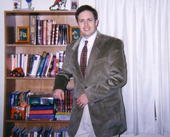The following is a meditation that I typed out to a question a friend asked my about how I know things. In other words, the question is about epistemology--the study of how we know things. Here is my response as I tried to look at my own experience and give a true accounting of it...
I am not a linguist and my comments will have very little to do with linguistics. Defining words properly is important in knowing, probably because it gets to the point of whether we can communicate properly. I am inclined to guess that concepts are defined within community, which indicates that they would be relatable as common experience. Additionally, I hold that many experiences are sufficiently similar to be universally understood, or at least widely understood across different times and places. Maybe this is one reason God established the knowledge of him through the communities of Israel and the church. And we all have logic, which can enable us to explain concepts. I am sure others could educate me on this far more than vice versa.
Reason, emotion, memory, logic, inspiration, imagination, revelation, repeated experience and conscience seem to be the tools I (and everyone else who is functioning properly) have been equipped with. I see in myself that these tools are used to establish core principles of thought and belief. These are often taken for granted. I assume my sense experience provides me with accurate data and my reasoning generally functions properly. Both are necessary to think, and must be accepted since you can't prove your reasoning is invalid because you would have to use your reason to do it, which then makes your proof self-defeating. You either take on faith or as a given that our faculties work or they don't, and one allows you to think and be human, while the other is unliveable. It appears that I have been designed to be a machine that can discover truth.
Having taken myself for granted, it appears that I have developed core principles through which I frame my experience. The core principles are developed using all the tools of my mental toolbox, as is the knowledge that I acquire over time. The fact that knowledge is filtered through our core principles does not mean that it is relative, with regard to truth. Almost nothing that we know can be segregated as being sui generis compared with our knowledge of other things. My core principles were developed by my family, my education, my spiritual upbringing, people I interacted with, and logic. Often they appear to be accepted as true on the basis that I trust the authority of my teacher(s). Then, as I mature and grow older I use my toolbox of faculties and experiences to test these lessons and refine them (if necessary). The use of my faculties appears to be a personally driven part of this process, while my experiences act on my from outside, often without my direction. My core principles are a result of a dynamic relationship between me and the outside world, with logic and my necessary assumptions providing the necessary boundaries for my knowing things and the ongoing process of discovery.
Inspiration and revelation appear to have a big part in my knowing something. I cannot tell you how many times I am hearing to someone talk and a thought pops into my mind that addresses the issue. I think most scientists and artists know better than I what I am describing. You are sitting there and working on something when a "bolt from the blue" strikes. Generally, this inspiration is related to other thoughts and knowledge I've had before, but happens quickly and is not the result of a conscious process of thinking. This may be even more pronounced for artists.
Knowing other people appears to be predicated both on our observation and their revelation of themselves. One person can observe another, but the level of knowledge in any endeavour will be much greater if the person being observed is actively revealing themselves. Additionally, being in relation with one another is another means of knowing since we are social creatures created to be in community.
Emotion is also an aid to knowing. Do I love someone? Do I love God? Well, my thoughts, actions, and emotions all have a role to play in answering that question. Being in love strikes me as similar to knowing whether I am walking. Am I walking? Well, the answer depends on what I am doing at the moment and whether it fits the definition. Do I love someone? Well, am I acting it out? If so, then the answer is yes.
Well, to summarize, I think that I know by taking foundational first principles as a necessity. Then, my core beliefs are taught to me and developed. Then, through the sum total of my mental toolbox, logic, experiences, relationships/communal experiences, and revelation/inspiration I am able to refine my beliefs and knowledge as well as learn new knowledge and continue the process of discovery. Let's hope that made at least a little sense!
9/28/2004
9/26/2004
New Blog
Thanks to my friend Marie Hall, I now have my own weblog. I will post on things going on in my life from time to time and hope you find it interesting. All this, and all I really wanted to do is write JMH a comment to a message to say hello!
9/20/2004
Subscribe to:
Comments (Atom)
